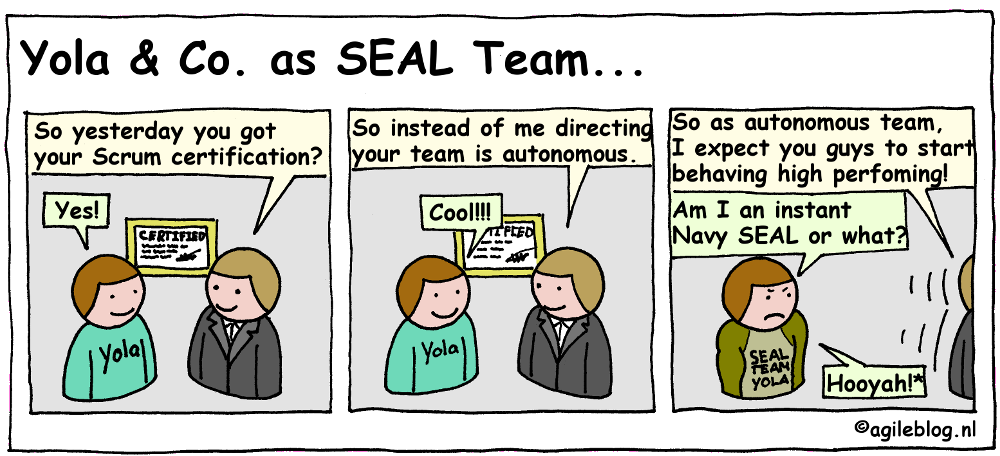on
Yola & Co. as SEAL Team…

- Possible meanings of ‘Hooyah’: Yes!, I understand, I’ll do it or F#@K You! or something else depending on the tone used. You know which one I mean here😉
In many discussions I’ve had in the past years as coach, scrum teams were compared to the famous elite teams from the military. Teams like SAS, Commando’s, SEAL-teams or Marine Corps. Especially when the discussion involves team autonomy for the development teams and the expectations of their management.
Okay, lets have a look on how those elite teams operate ‘autonomously’. First of all, they decide how to dress up for the mission, whether they use body protective armour or not, what type of weapons to be used and how they approach the targeted objective, by sea, land or air. A HALO or HAHO jump? Of course they are taking into account the type of mission and the outcome of the analysis of the objective on before hand. Beside this, they also decide on how much gear they carry with them for the trip depending on the length of the mission. They pack differently for a three day mission then for a mission lasting two weeks.
How does this reflect on the wanted behaviour of the development teams we see in IT. In essence we like to see the same behaviour with our development teams (either in IT or not). We want them to select their own equipment as well, i.e. build servers, SDK’s, IDE’s, deployment servers, code checkers, etc, etc. And based on the assignment they should choose how to reach the objectives they are being set. They decide on how to achieve the objective. They choose the amount of effort for testing needed. Similar to not wearing body protective armour during a firefight, when misjudged things might become messy. Fortunately this messy stuff will only be fatal to the system, not the employees in our case.
For both types of teams the same things do apply, with doing comes experience and with failing comes learning. Fortunately for the development teams failing is not as fatal as for soldiers so learning is less hazardous for them. So for the soldiers serving in the elite teams, most of them are being selected from the regular units in the military. They have been spending several years in their unit being trained to get better in what they do before they can apply for a position in a special unit. If we look at the Navy SEALs, most of them are selected from those special units either in the US Army, the US Navy or US Airforce. At that time most of them have several years of experience and have executed more than one mission. Only then they can apply for a position at the Navy SEALs and they might be selected for that position…..and they end up in Green Team, so: “Let the training begin…”. It starts all over again and the instructors will make them believe they don’t know shit yet.
So maybe it’s time for managers to look at their departments as if they are regular army. A poorly trained, poorly experienced and poorly equipped regular army. An army trained to shut up and obey while executing orders (no kidding, I hear a lot of people ask me to tell them what to do and they’ll do it like I told them). As soon as management finds out about Agile they require teams to be autonomous, self directive, self organised, self managed and they demand immediate accountability for the team results. I know, Agile is not for the faint hearted, that’s why I refer to Navy SEALs in the first place when I try to put Agile teams in perspective. They are highly skilled, well disciplined and self directive teams with years of experience. And we have to train them, train them and train them again, with courses, hackathons, POC’s etc.
So my thought about this? Create an Agile mindset in all ranks in your regular army. Select the most talented employees to be the first to join the Agile way of working in your SEAL units. Then choose your battles wisely, deploy your most Agile units in the complex domain while deploying the regular units in the obvious and complicated domains. And please, please don’t expect your employees to be autonomous and self directive just because you told them to be and by letting them get their certificate. It requires years of training and experience for employees to get there. Of course they will fail once in a while but unlike real soldiers, they won’t die on you and in the end, you’ll have your own IT-SEAL-Teams. Now how cool is that?